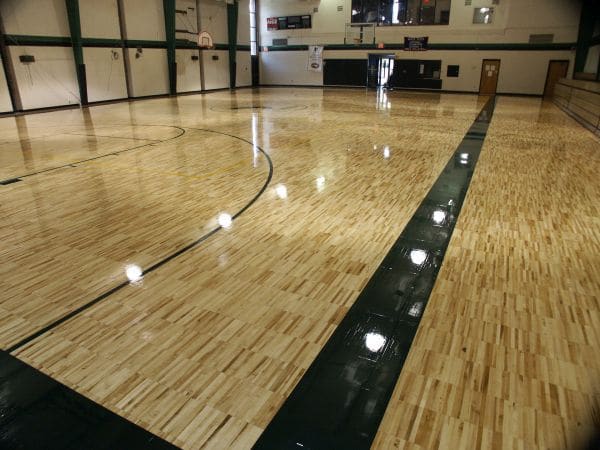Sports flooring differs immensely from floors designed for any other purpose. Because the needs of athletes come first, performance, safety and comfort are inherent characteristics.
Floor design can focus on a specific activity, say aerobics versus basketball, or on multiple purposes to suit the exact need of a facility or application: gymnasiums; handball, squash and racquetball courts; basketball courts; health and fitness clubs; international Olympic facilities; professional sports arenas; aerobic/dance exercise facilities; dance floors; auditoriums and convention centers; church and religious facilities; primary and secondary schools; colleges and universities; corporate exercise facilities; YWCA/YMCAs; family life centers; roller skating rinks; theater and performance stages; or commercial, industrial and residential applications.
Time and again, athletes, performers, coaches, trainers, owners and architects who design floors cite maple as their preferred sports surface. In fact, maple shows up on 70 percent of the sports floors installed in the U.S. The most preferred variety, northern hard maple from MFMA manufacturers, accounts for 58 percent of all U.S. sports floors — more than 22 million square feet — installed each year.
Northern hard maple has been called nature’s perfect flooring surface. MFMA maple is produced from trees grown north of the 35th parallel where shorter growing seasons produce maple with closer, more uniform grain. In a floor, northern hard maple exhibits flexibility, resilience, durability, finish ability and low-demand maintenance.
“We are very pleased with the athletic performance on our MFMA floors in our varsity basketball arena, intramural gym and dance studio…we have found MFMA maple to be very aesthetically pleasing,” says Barbara Bickford, associate director of athletics, Brandeis University.
Athletic performance is enhanced by its hard-but-resilient character. Subfloor systems enhance maple’s natural shock absorption and area elasticity. And the surface provides dependably uniform grip and traction to athletic footwear.
Northern hard maple was first used in sports flooring nearly 150 years ago. From the beginning, it was evident, however, that even “nature’s perfect flooring” needed a little help if consistently outstanding floors were to be built.
Consistent quality became the mission of a handful of producers who, in 1897, formed the Maple Flooring Manufacturers Association — the MFMA. Their purpose was to research and develop the best procedures for the selection and grading of the wood.
Over time, a set of strict, self-imposed manufacturing standards evolved for members, which they adopted in pursuit of consistent quality.
Each MFMA mill is subject to periodic, unannounced, third-party inspections to assure strict adherence to MFMA rules governing continuity of specie, millage and grading of MFMA maple flooring. The Milling Company Manufacturer members of the MFMA have dedicated their production of solid strip maple flooring to the highest levels of quality.
The association established itself as the authoritative source of technical and general information on sports flooring. Equally important, the MFMA established installation and maintenance standards to help its sport floor contractor members deliver and assure a product that lives up to its promises.
Year after year, installation after installation, MFMA grading rules have assured consistent quality. Due to their prominent position in the athletic flooring market, the MFMA mills collectively continue to lead by establishing performance standards for sports floors.
MFMA manufacturers continuously test and develop various subflooring systems in order to maximize athletic performance on maple sports surfaces.
To top it off, the MFMA publishes a list of tested, recommended floor finishes that are designed to optimize athletic performance while enhancing the legendary durability of the maple playing surface.
In the unlikely event that an on-site inspection of an MFMA floor is required, inspection and evaluation by qualified MFMA staff is available.
More than 165 MFMA sports floor contractor members and distributors worldwide follow procedures affecting the handling, storing and installation of MFMA maple.
MFMA sport floor contractor members are uniquely equipped to assist architects and facility owners with the design and construction of new athletic facilities, renovations and sports floor replacements.
MFMA also offers sport floor contractor members the Accredited Installers Program (AI Program) as a tool to help train their employees on proper installation practices and on MFMA standards and recommendations.
The AI Program improves installer’s competencies in the installation of MFMA sports flooring systems and provides architects, construction specifiers and end-users with information to make informed choices about the selection of qualified installers and installation companies.
To ensure you have an accredited sport floor contractor member bidding on your next project just include the following in your project specification under “Quality Assurance”: The flooring contractor shall be an MFMA Mill Accredited Installation Company with MFMA Accredited Installer(s) on site for the duration of the wood floor installation.
An MFMA mill number is embossed into the back of every strip of MFMA maple. It is your guarantee that strictly enforced MFMA grading rules and quality standards have been painstakingly followed in the production of each strip of flooring. It assures the wood has been kiln dried to 6 to 9 percent moisture content which makes it dimensionally stable before manufacturing begins. It assures that the finished maple strip has been milled to consistently exact tolerances as mandated by the MFMA.
“In over 20 years of specifying hardwood gym floors in schools, I have never had to reject a single piece of MFMA flooring for any reason,” says Joe Elliott, Little & Associates Architects, Charlotte, North Carolina.
PUR Standards
Within the last 20 years, there has been a movement within the industry to quantify performance characteristics that best define “a good sports floor.”
As a result, our industry has hundreds of different sports flooring systems, each with varying levels of performance. Within this range of system options, there are some common performance characteristics the industry has recognized as being most desired and important.
MFMA’s PUR Standards focus on shock absorption, vertical deflection, area of deflection, ball bounce and surface friction. These standards have been designed, utilizing exacting testing methodologies, to ensure that customers receive a reliable, well-performing, competitive sports surface.
When a specific flooring system is a MFMA PUR Compliant floor, it is tested on a strict pass/fail evaluation. MFMA will only allow the use of the term “compliant” as it pertains to PUR testing; either a floor is compliant and passes the standards or it does not.
For additional information on MFMA testing procedures, contact MFMA Headquarters at 888-480-9138 or mfma@maplefloor.org or any of the MFMA Mill Manufacturing members on their system(s) that have been tested in accordance with the MFMA PUR Standards.











